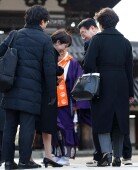[Editorial] 60th Anniversary of Constitution
[Editorial] 60th Anniversary of Constitution
Posted July. 17, 2008 08:30,
Sixty years ago today, on July 17, 1948, the first Constitution of Korea was born. The Dong-A Ilbo celebrated the birth in an article embellished with colorful expressions, reading in part, The cloudy days are gone, and songs of birds are filling the air. All seem to celebrate the bright future of our country. The birth marked the first day of a republic ruled by citizens on the Korea Peninsula in its 5,000-year long history. One month later, the Rhy Seung-man administration, the first of its kind in Korea, was inaugurated, in the nations first step as a republic.
Our republic history, however, has been dotted with misfortunes such as the Korean War, two military coups, and decades-long fights against dictatorship, to name just a few. The Constitution was also suspended from time-to-time, and underwent overall revisions nine times. The historic June 1987 democratic struggle led to the birth of the current version of the Constitution, helping democracy take deep root in society. The Constitutional Court of Korea, which was established in 1988, has set various norms and ordinary Koreans have taken the norms into their daily lives.
A constitution is the road sign and pillar of a state that sustains and leads with it. But our Constitution now faces the most serious challenges in its 60-year history. The guiding principles of free democracy, rule of law, and the market economy are being impaired. Some groups of people do not hesitate to use violence in the name of direct democracy and to disparage the rule of law and the representative system. Socialists and liberals are trying to topple a legitimate administration by staging systematic resistance to election results. They are threatening the major dailies in Korea by coercing their advertising sponsors in outright disrespect of free speech and the market system, and are holding kangaroo courts on law enforcement officers who enforce law in society. They are categorically denying what our Constitution is meant to protect.
Renowned constitutional scholar Heo Yeong of Myongji University stressed, Once we interpret or revise the Constitution without considering the guiding principles of the free democracy, the rule of law and the market economy, its not an act of revision or interpretation its an act that destroys it. He continued, Some have coined new terms like digital democracy and plaza democracy. But the terms deny the representative system promulgated in our Constitution. They are intended to destroy our constitutional order.
Some lawmakers are leading the move toward a new constitution. But the revision shall not damage the guiding principles of our Constitution. What our Constitution represents is what all civilized societies pursue and what shall not be compromised. We have sacrificed a lot to achieve what we have now, and we mustnt forget it.







